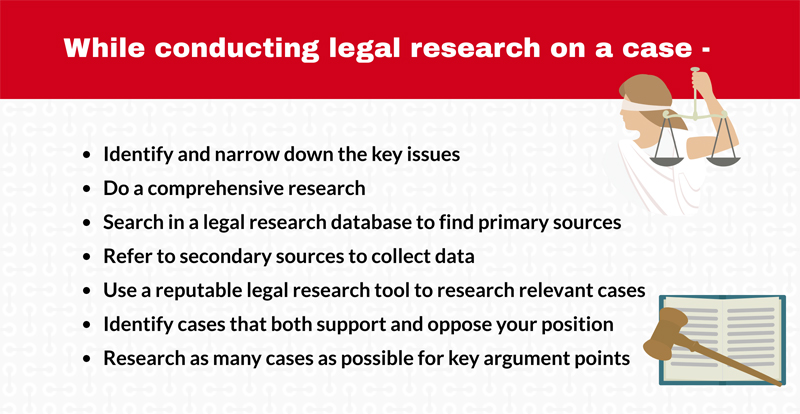This is an update to the blog, “Purpose of Legal Research”.
Legal research refers to the research process that lawyers use to decide which laws apply to the facts of their case and facts that are relevant to their claim. Lawyers lose or win cases based on the quality of legal research. One of the key legal process outsourcing services, this process requires excellent research skills and dedication to find relevant past decisions from case law.
Once you have read the case law and determined that it is truly relevant and binding, consider these best practices for your legal research.
Collect the facts of the Case
Collecting all the facts relevant to the case you handle helps to get a complete understanding of everything that has happened, or is happening, in your case. Never leave out any facts, even if those are considered un important. Create a list of all the facts you know and don’t know. This helps to gather missing information from secondary sources. These sources of law, including legal encyclopedias, law journals and Google Scholar help you understand all legal principles such as case law, regulations, and statutes.
Include dates and locations of all the incidents. Include these dates and statement of facts to make a case timeline. Timeline with all important dates and events will serve as a visual reference in your legal research process. Once all the data is collected, revise it to make sure it is accurate and reflects all the facts related to the case.
Perform a comprehensive research
Follow a comprehensive research method which includes reading statutes and referring even years-old Supreme Court cases that are only slightly relevant. This helps to gain a deep and broad understanding of the law so that you can truly craft your argument. Finding a case that is exactly similar to the one you are handling may be quite difficult.
Use efficient legal research tools
Lawyers or paralegals conducting legal research must always check the status of any case to ensure what they cite is accurate and relevant, otherwise they will lose their credibility. An advanced legal research tool will ensure that you get accurate search results when looking for the most relevant and up-to-date cases on a particular legal issue. Many tools also alert a legal researcher when their case experiences any form of negative treatment, such as being over ruled or distinguished by another case. For instance, Westlaw’s KeyCite tool clearly identifies the source of negative treatment and indicates if there are particular head notes or legal issues that are implicated. This tool also informs the users when a case has a pending appeal.
Utilize advanced research tools to search relevant terms in a case, instead of searching the whole document. This helps to quickly evaluate whether the point of law answers your question or supports your position.
Research both positive and negative cases
During legal research, look for both positive and negative cases. This provides a full understanding of how strong or weak your arguments are based on controlling case law in your jurisdiction. Locating landmark cases that discuss the specific issue in your jurisdiction will provide a full explanation of what the law is regarding your issue. This will also lead you to other related cases. You can find a chronological legal road map of how the law on your specific issues has changed over time, and tell you the current state of the law and what controlling cases are present. Refer to as many cases as possible that you find as a result of your research. While the positive cases help boost your arguments, negative cases can be used to distinguish it from the unique facts of your case. Such efforts will help you shape the strongest possible argument.
A thorough legal research is the backbone of any lawyer’s practice and this presents a better opportunity to win a case. It is time that law firms left those outdated and inefficient traditional legal research databases and relied on advanced software to improve the quality and speed of legal research.





